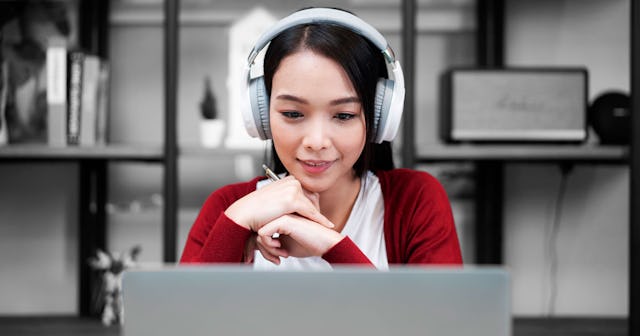How I Use My Power And Privilege To Combat Erasure

“Can we do a Diverging Magazine statement?” my friend texted a few days after George Floyd’s death by police violence. At the time, I was a newish editor at Diverging Magazine, an online mag published by the Progressive Asian American Christian (PAAC) community.
I struggled a bit for context to his out-of-the-blue message. And then I figured it out. “Oh, for BLM? I can ask,” I replied.
“Yeah. For what is going on right now.”
“Hmmmmmm… just remembered I’m the Living Justice editor.”
“Yes, you are! Which is why I am asking you.”
I might have actually facepalmed. My “aha moment” was nothing short of embarrassing. After all, the Living Justice vertical existed to highlight the justice work PAAC members did — to explore the personal and theological roots and rationales of their work. What was Black Lives Matter if not about justice?
And yet, though BLM was firmly within the wheelhouse of my column — especially since many Asian Americans are also allies (myself included), I had blanked during a critical moment.
You have more power than you think
Oscar Wong/Getty
You and I — we have so much more power and influence than we think we do. It feels so gauche to acknowledge — especially for women. After all, who wants to be the pompous asshat so enamored of their own authority, connections, and reach? And if you identify as a woman, it feels particularly egotistic.
And yet, we forget. Or worse — we know we have power (or proximity to power), but we’re either too afraid to lose it or we don’t care enough to use it.
Whatever the reasons, here’s a friendly reminder: Step into your power. Not only in your personal channels — but your professional, community, religious, and civic circles, too.
My friend reminded me that I’m the Living Justice editor of Diverging Magazine. I’m also the entertainment editor for Mochi magazine. I’m also a freelance writer for various publications (including this one). These aren’t courtesy titles or a nice capstone on a resume. I have power. How am I going to use it?
How I use my power to combat erasure and other injustices
One of the most purposeful ways I use my power is to fight erasure, or the rendering of certain people and groups — especially inconvenient voices — and their histories, achievements, and stories invisible. As a writer and editor, I have access to platforms that can spread my words farther and wider than my own, and I choose to use my words to amplify the voices of the underrepresented.
At times, it is literally writing an article from the point of view of my own intersectional identities of Asian American and female.
It is asking my fellow editors at Diverging Magazine about our response to George Floyd’s death, Black Lives Matter, and the ensuing demonstrations.
It is working with a team of dedicated writers and editors to draft a letter of solidarity and creating a series to give Asian Pacific Islander Desi Americans (APIDA) who want to do something but don’t know where or how to start.
It is being part of a team of influencers — spearheaded by my friend and fellow writer Brandi Riley — and creating a free toolkit for influencers to help them educate and inform their audiences.
It is choosing what movies, shows, and artists to feature as an entertainment editor or on my own site.
It is being mindful of who (and how) I quote as experts and parents, paying attention especially to include names and customs that don’t read “white” and normalizing POC and non-heterosexual parenting narratives.
It is not only quoting POC and non-traditional families during articles about diversity or “very special episode” posts.
It is being careful with how I depict and represent minorities and historically oppressed people in my stories and my spheres.
It is including facts highlighting disparities and injustice in “normal” articles about childcare, healthcare, parenthood, and other seemingly irrelevant topics — as if every single topic is not affected by any of our intersecting identities of race, class, gender, religion, ability, and sexuality.
It is actively promoting, crediting, and sourcing ideas and content from POC and underrepresented creatives, entrepreneurs, and leaders.
It is recommending POC writers and influencers to my editors and brand partners when they ask for suggestions — and even when they don’t.
It is being particularly aware of intersecting identities when curating lists — especially lists focused on diversity — and taking extra care to highlight folks who are perhaps underrepresented even within their own minority group (e.g.: South Asians and South East Asians among Asian Americans).
As a YouTuber, it is choosing to discuss the issues of systemic racism, misogyny, or oppression in my podcasts and K-pop reaction videos.
It is addressing these same issues prevalent within and between fandoms and diving into the messiness of problematic faves, anti-Blackness, and other ways K-pop groups and companies offend and hurt certain groups of people.
Is this all just a not-so-subtle flex?
I provide these examples not to brag or make myself sound super woke — or even to shame others into comparable actions. Rather, I wanted to show that even within the mundane task of writing about what questions to ask your dermatologist or how to use tea tree oil, I can still fight erasure simply by who I choose to highlight.
These are not loud or dramatic ways I combat systemic injustice.
These are boring. Unsexy. Quotidian.
Even so, these are the spheres within which I hold power and privilege — and I choose to make the most of it. I am grateful to my friends who trust me with their stories — and their friends’ stories, too. I hope in my small ways, I can uphold that trust and represent the underrepresented a little more clearly.
This article was originally published on